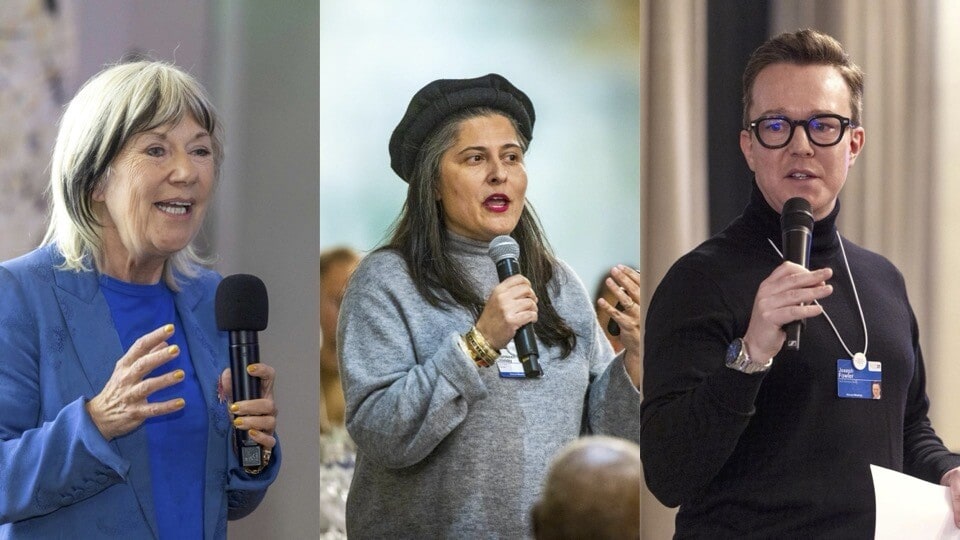10 movies that changed the world

A good film has the power to do more than entertain Image: REUTERS
A good film does more than entertain or fill seats at the cinema. It has the power to change hearts and minds – and sometimes society more widely.
It’s something Haifaa Al Mansour, Saudi’s first female film-maker, highlighted when she spoke with us last year about her award-winning film Wadja: “Art can touch people and make them open up.”
The following films have been hugely influential, raising awareness and bringing about change in areas from climate change to gay rights.

Around the world, 5,000 women’s lives are taken each year in so-called “honour killings”. A Girl in the River, from Oscar-winner and Young Global Leader Sharmeen Obaid-Chinoy, tells the story of Saba Qaisera, a young woman who survived an attempted murder at the hands of her father. Her only crime? Falling in love with the wrong person.
Even after the events, Obaid-Chinoy found that the father could not understand why what he had done was wrong. “He felt justified in trying to kill his own daughter. He felt it was his duty as a father and husband to protect his family from the ‘dishonour’ Saba brought on them by falling in love and getting married.”
Not everyone agreed with him. “This week, the Pakistani prime minister said that he will change the law on honour killing after watching this film,” Obaid-Chinoy said in her Oscar acceptance speech. “That is the power of film.”
In 2015, SeaWorld announced it was ending its controversial “Shamu Show” and replacing it with an “all-new orca experience” to focus on the “natural behaviour of whales”.
Although they didn’t say as much, their decision was almost certainly a result of the public outcry created by the 2013 documentary Blackfish. The film drew attention to the dangers of keeping orcas in captivity – for both the animals and their human trainers. In the years following its release, the documentary took its toll on the company’s reputation, visitor numbers and share price (which dropped from $39 in 2013 to $18 at the time of the SeaWorld announcement).
In this blockbuster hit, the world is facing a second ice age: a tidal wave submerges New York City, tornadoes rip through downtown Los Angeles, and hail stones the size of grapefruits batter Tokyo. While the science behind the film was called out by many climatologists, it was still one of the most commercially successful movies of its time – it made almost half a billion dollars worldwide in just over a month.
According to Yale researchers, it also helped increase awareness on climate change, and encouraged people to consider how their actions could help avert such an environmental crisis: “Across the board, the movie appears to have had a strong influence on watchers’ risk perceptions of global warming,” the academics concluded.


While homelessness is still described as an “invisible problem” – mainly because many of us find it easier to ignore – it’s at least less of a taboo subject than it was in the past. Before Cathy Come Home was released in 1966, nobody spoke about the issue: “Homelessness hadn’t been in the spotlight before,” said the drama’s director Ken Loach.
After the drama aired, all that changed. “The sense of public outrage that this was happening sort of grew. It became like a storm that gathered pace.” At the same time, the UK’s first and leading charity on homelessness, Shelter, was founded. Even today, the impact of the film is still being felt: “We were expecting that there would be a bit of talk about it but no one could expect that 40 years later we’d still be talking about it and that Cathy would become part of the national language about public events in politics,” Loach said in 2006.
It can be difficult for anyone who didn’t live through the start of the AIDS epidemic in the early 1980s to understand just how much stigma, fear and misunderstanding surrounded the disease. A 1985 poll in the US found that 51% of Americans felt people living with AIDS should be placed in quarantine, and 15% thought they should be identified with tattoos.
When Philadelphia was released in 1993, it helped changed those perceptions. The film follows the journey of a young gay lawyer, played by Tom Hanks, who is fired by his firm after discovering he has AIDS. It was the first Hollywood film to tackle the issue of AIDS and homophobia, and it helped destigmatize a subject that until then few had wanted to discuss: “It got people talking about HIV in a way that they really weren’t, because it was always that thing we really didn’t want to talk about,” said HIV advocate Gary Bell.
For an entire month, in an attempt to establish the damage fast food does to our bodies, Super Size Me director Morgan Spurlock ate only one thing: McDonald’s. After the experiment was over, he had gained 25 pounds, his cholesterol levels had shot up, and his doctor said he had the liver of an alcoholic.
The documentary reignited the debate on fast food – everything from how bad it is for our health to the way it is marketed at children. A few weeks after the film was released, McDonald’s ditched its super size option and started introducing healthier items to its menus, although they deny this was in response to the documentary.
Rosetta, described on its release as a “wrenching work of social realism”, follows the life of a young, poor Belgian teenager living on a trailer park with her alcoholic mother. When she’s not looking after her mum, she’s desperately trying to find and hold on to a job, in the vain hope of working her way out of her situation.
The movie not only touched critics – against all odds, it won the Palme D’Or at the Cannes film festival – but also Belgian policy-makers. The same year, they voted through “Rosetta’s Law” to protect the rights of teenage workers in the country.
This Oscar-winning short film follows the life of Trevor, a gay 13-year-old who attempts suicide after being ostracized by his peers because of his sexuality. Shortly before the film was released, director Peggy Rajski realized there was no place in the US for young people like Trevor to turn to at their time of need. With the help of mental health experts, she established and secured the funds for a 24-hour crisis hotline for lesbian, gay, bisexual, transgender and questioning youth.
Almost 20 years on, the Trevor Project has helped hundreds and thousands of young people, and also provides workshops and online resources.
There are plenty more fish in the sea, right? Maybe not. As The End of the Line highlighted, overfishing is having a devastating effect on our oceans, and unless we take action fast, we’ll soon be running out. The goal of the film was simple: raise consumer and corporate awareness on the issue and increase marine reserves.
More than 4 million people watched the film in the UK alone, including the country’s prime minister. After being shown the film, large UK retailers, from Marks and Spencer to Pret A Manger, changed their fishing source policies to ensure they were sustainable. The film’s production team also went on to launch a charity, the Blue Marine Foundation, to continue with the campaign.
The movie Selma, which tells the story of Martin Luther King Jr’s campaign to secure equal voting rights, was released almost 50 years after the events it depicts. But it came at a time of renewed racial tensions in the US and a movement to recognize that black lives matter.
The film crew and cast were therefore keen to align themselves with this movement and bring attention to the fact that while progress had been made, there is still much more to do. “You watch the film and you understand how it feels to be someone in 1965, being shocked about what they saw on TV, because it just happened to you”, said Ava DuVernay, the film’s director, referencing the death of an unarmed black man at the hands of the police and the events that followed.
Have you read?
Don't miss any update on this topic
Create a free account and access your personalized content collection with our latest publications and analyses.
License and Republishing
World Economic Forum articles may be republished in accordance with the Creative Commons Attribution-NonCommercial-NoDerivatives 4.0 International Public License, and in accordance with our Terms of Use.
The views expressed in this article are those of the author alone and not the World Economic Forum.
Stay up to date:
Arts and Culture
Forum Stories newsletter
Bringing you weekly curated insights and analysis on the global issues that matter.
More on Arts and CultureSee all
Elena Raevskikh and Giovanna Di Mauro
October 22, 2025






